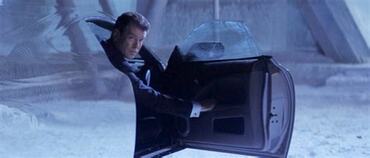Driving while invisible
 The point is not whether it's ludicrous but whether it breaks the law.
The point is not whether it's ludicrous but whether it breaks the law.
Until Hannah Smethurst began speaking at this week's gikii event - the year's chance to mix law, digital rights, and popular culture - I had not realized just how many invisible vehicles there are in our books and films. A brief trawl turns up: Wonder Woman's invisible jet, Harry Potter's invisibility cloak and other invisibility devices, and James Bond's invisible Aston Martin. Do not trouble me with your petty complaints about physics. This is about the law.
Every gikii (see here for links to writeups of previous years) - ranges from deeply serious-with-a-twist to silly-with-an-insightful undercurrent. This year's papers included the need for a fundamental rethink of how we regulate power (Michael Veale), the English* "bubble" law that effectively granted flatmates permanent veto power over each other's choice of sex partner (gikii founder Lilian Edwards), and the mistaken-identity frustrations of having early on used your very common name as your Gmail address (Jat Singh).
In this context, Smethurst's paper is therefore business as usual. As she explained, there is nothing in highway legislation that requires your car to be visible. The same is not true of number plates, which the law says must be visible at all times. But can you enforce it? If you can't see the car, how do you know you can't see the number plate? More uncertain is the highway code's requirement to indicate braking and turns when people don't know you're there; Smethurst suggested that a good lawyer could argue successfully that turning on the lights unexpectedly would dazzle someone. No, she said, the main difficulty is the dangerous driving laws. Well, that and the difficulty of getting insurance to cover the many accidents when people - pedestrians, cyclists, other cars - collide with it.
This raised the possibly of "invisibility lanes", an idea that seems like it should be the premise for a sequel to Death Race 2000. My overall conclusion: invisibility is like online anonymity. People want it for themselves, but not for other people - at least, not for other people they don't trust to behave well. If you want an invisible car so you can drive 100 miles an hour with impunity, I suggest a) you probably aren't safe to have one, and b) try driving across Kansas.
We then segued into the really important question: if you're riding an invisible bike, are *you* visible? (General consensus: yes, because you're not enclosed.)
On a more serious note, people have a tendency to laugh nervously when you mention that numerous jurisdictions are beginning to analyze sewage for traces of coronavirus. Actually, wastewater epidemiology, as this particular public health measure is known, is not a new surveillance idea born of just this pandemic, though it does not go all the way back to John Snow and the Broadwick Street pump. Instead, Snow plotted known cases on a map, and spotted the pump as the source of contagion when they formed a circle around it. Still, epidemiology did start with sewage.
In the decades since wastewater epidemiology was developed, some of its uses have definitely had an adversarial edge, such asestablishing the level of abuse of various drugs and doping agents or particular diseases in a given area. The goal, however, is not to supposed to be trapping individuals; instead it's to provide population-wide data. Because samples are processed at the treatment plant along with everyone else's, there's a reasonable case to be made the system is privacy-preserving; even though you could analyze samples for an individual's DNA and exact microbiome, matching any particular sample to its own seems unlikely.
However, Reuben Binns argued, that doesn't mean there are no privacy implications. Like anything segmented by postcode, the catchment areas defined for such systems are likely to vary substantially in the number of households and individuals they contain, and a lot may depend on where you put the collection points. This isn't so much an issue for the present purpose, which is providing an early-warning system for coronavirus outbreaks, but will be later, when the system is in place and people want to use it for other things. A small neighborhood with a noticeable concentration of illegal drugs - or a small section of an Olympic athletes village with traces of doping agents above a particular threshold - could easily find itself a frequent target of more invasive searches and investigations. Also, unless you have your own septic field, there is no opt-out.
Binns added this unpleasant prospect: even if this system is well-intentioned and mostly harmless, it becomes part of a larger "surveillant assemblage" whose purpose is fundamentally discriminatory: "to create distinctions and hierarchies in populations to treat them differently," as he put it. The direction we're going, eventually every part of our infrastructure will be a data source, for our own good.
This was also the point of Veale's paper: we need to stop focusing primarily on protecting privacy by regulating the use and collection of data, and start paying attention to the infrastructure. A large platform can throw away the data and still have the models and insights that data created - and the exceptional computational power to make use of it. All that infrastructure - there's your invisible car.
Illustrations: James Bond's invisible car (from Live and Let Die).
*Correction: I had incorrectly identified this law as Scottish.
Wendy M. Grossman is the 2013 winner of the Enigma Award. Her Web site has an extensive archive of her books, articles, and music, and an archive of earlier columns in this series. Stories about the border wars between cyberspace and real life are posted occasionally during the week at the net.wars Pinboard - or follow on Twitter.